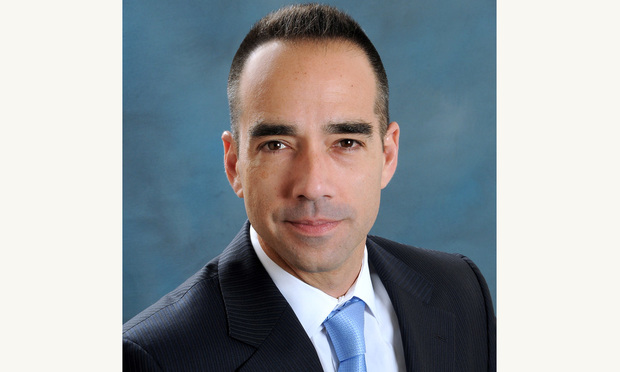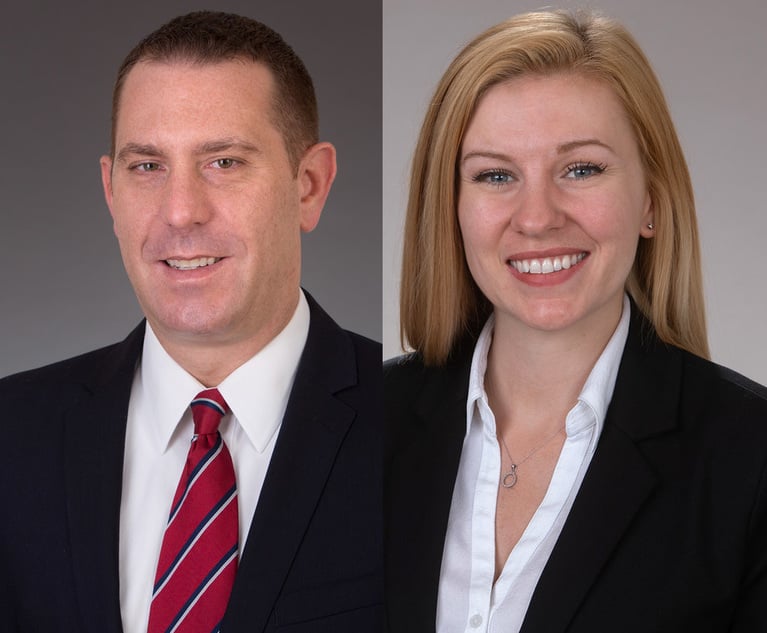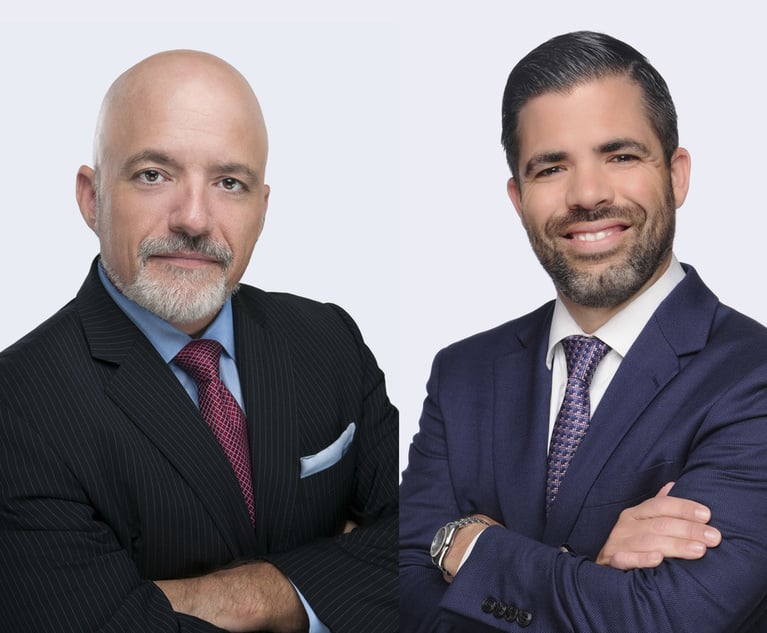New Venezuela Sanctions: What They Mean and Why You Should be Aware
On Aug. 5, the president of the United States issued Executive Order 13884, blocking all property of the government of Venezuela in the United States. Banks, companies and individuals, in the United States and worldwide, especially those engaged in international business, should understand what the executive order means, why it’s important to be aware, and what to do.
August 20, 2019 at 09:33 AM
5 minute read
 Jarrett Wolf president with Wolf Global.
Jarrett Wolf president with Wolf Global.
On Aug. 5, the president of the United States issued Executive Order 13884, blocking all property of the government of Venezuela in the United States. Banks, companies and individuals, in the United States and worldwide, especially those engaged in international business, should understand what the executive order means, why it’s important to be aware, and what to do.
What the New Venezuela Sanctions Mean
Although there are exceptions, in general terms, the order blocks all property of the Venezuelan government in the United States, that comes within the United States, or that is or comes within the possession or control of any U.S. person or entity.
For purposes of the order, the government of Venezuela includes:
- The state and government of Venezuela;
- Any political subdivision of the government of Venezuela;
- Any agency, or instrumentality of the government of Venezuela, including the Central Bank of Venezuela and Petroleos de Venezuela, S.A. (PdVSA); and
- Any person or entity owned or directly controlled by any of the foregoing.
The order also blocks the property and interests in property of:
- Any person or entity determined to have materially assisted or provided financial, material or technological support for, or goods or services to or in support of, any specially designated national; and
- Any person or entity determined to be owned or controlled by, or to have acted or purported to act for or on behalf of, any person whose property and interests in property are blocked pursuant to the executive order.
As of the time of this writing, more than 200 persons or entities are designated as specially designated nationals under the Venezuela programs of the Department of Treasury’s Office of Foreign Assets Control (OFAC).
Why You Need to Be Aware
Cases involving sanctions violations can result in fines, forfeitures and civil monetary penalties, and in some cases, corporate or individual criminal liability.
Although it might seem counterintuitive, aware of the condition of the Venezuelan economy, the same entities and individuals targeted by the order and by sanctions might attempt to get their money out of Venezuela and into more stable economies, including in the United States. To do so, they might employ intermediaries. U.S. persons, meaning U.S. banks, companies and individuals, as well as non-U.S. persons transacting business in U.S. dollars, need to be aware of the risks this creates.
Likewise, because they are blocked from the U.S. financial system, entities and individuals of the Venezuelan government might also use intermediaries not only to acquire goods or services from the United States, but to acquire goods or services from around the world, in transactions involving U.S. dollars and, therefore, in violation of the executive order.
What You Can Do
- Implement a sanctions compliance program.
Banks and companies, particularly companies engaged in international business or serving international clients or customers, should develop and implement a sanctions compliance program. The program should be risk-based, meaning it should be proportionate to the risk profile of the bank or company.
As described by OFAC earlier in 2019, the five essential elements of a sanctions compliance program are:
- Management commitment;
- Risk assessment;
- Internal controls;
- Testing and auditing; and
- Training.
The time to implement a sanctions compliance program is now, not after a violation.
- Conduct an Internal Investigation.
There are two ways a company can learn it may have violated U.S. sanctions. The company might discover a possible violation on its own; or the company might learn that it has become the subject or target of an investigation by the U.S. government.
If a company discovers on its own that it might have violated U.S. sanctions, then an internal investigation should be conducted by qualified professionals to determine whether there has, in fact, been a violation and whether disclosures will need to be made.
If the company is notified that it has become the subject or target of an investigation by the U.S. government, then a dialogue should be opened with the U.S. government and, again, an internal investigation should be conducted.
If the investigation reveals evidence which would negate the concerns of agents and prosecutors, then that evidence can be presented to the agents and prosecutors, through counsel. Conversely, if the investigation reveals evidence confirming a violation, then counsel can work to legally and ethically resolve the matter.
Venezuela sanctions are intended to advance U.S. foreign policy objectives. As with all executive orders calling for the blocking of property and implementation of sanctions, the Departments of State and Treasury would rather see companies comply, than have to see the OFAC or the Department of Justice investigate, bring enforcement actions or prosecute violations.
Jarrett Wolf, based in Miami and New York, is the president of Wolf Global, an advisory and consulting firm focused on corporate investigations, crisis management, risk mitigation and strategy, for U.S. and international clients and their counsel. He can be reached at [email protected].
This content has been archived. It is available through our partners, LexisNexis® and Bloomberg Law.
To view this content, please continue to their sites.
Not a Lexis Subscriber?
Subscribe Now
Not a Bloomberg Law Subscriber?
Subscribe Now
NOT FOR REPRINT
© 2025 ALM Global, LLC, All Rights Reserved. Request academic re-use from www.copyright.com. All other uses, submit a request to [email protected]. For more information visit Asset & Logo Licensing.
You Might Like
View All



Trending Stories
Who Got The Work
J. Brugh Lower of Gibbons has entered an appearance for industrial equipment supplier Devco Corporation in a pending trademark infringement lawsuit. The suit, accusing the defendant of selling knock-off Graco products, was filed Dec. 18 in New Jersey District Court by Rivkin Radler on behalf of Graco Inc. and Graco Minnesota. The case, assigned to U.S. District Judge Zahid N. Quraishi, is 3:24-cv-11294, Graco Inc. et al v. Devco Corporation.
Who Got The Work
Rebecca Maller-Stein and Kent A. Yalowitz of Arnold & Porter Kaye Scholer have entered their appearances for Hanaco Venture Capital and its executives, Lior Prosor and David Frankel, in a pending securities lawsuit. The action, filed on Dec. 24 in New York Southern District Court by Zell, Aron & Co. on behalf of Goldeneye Advisors, accuses the defendants of negligently and fraudulently managing the plaintiff's $1 million investment. The case, assigned to U.S. District Judge Vernon S. Broderick, is 1:24-cv-09918, Goldeneye Advisors, LLC v. Hanaco Venture Capital, Ltd. et al.
Who Got The Work
Attorneys from A&O Shearman has stepped in as defense counsel for Toronto-Dominion Bank and other defendants in a pending securities class action. The suit, filed Dec. 11 in New York Southern District Court by Bleichmar Fonti & Auld, accuses the defendants of concealing the bank's 'pervasive' deficiencies in regards to its compliance with the Bank Secrecy Act and the quality of its anti-money laundering controls. The case, assigned to U.S. District Judge Arun Subramanian, is 1:24-cv-09445, Gonzalez v. The Toronto-Dominion Bank et al.
Who Got The Work
Crown Castle International, a Pennsylvania company providing shared communications infrastructure, has turned to Luke D. Wolf of Gordon Rees Scully Mansukhani to fend off a pending breach-of-contract lawsuit. The court action, filed Nov. 25 in Michigan Eastern District Court by Hooper Hathaway PC on behalf of The Town Residences LLC, accuses Crown Castle of failing to transfer approximately $30,000 in utility payments from T-Mobile in breach of a roof-top lease and assignment agreement. The case, assigned to U.S. District Judge Susan K. Declercq, is 2:24-cv-13131, The Town Residences LLC v. T-Mobile US, Inc. et al.
Who Got The Work
Wilfred P. Coronato and Daniel M. Schwartz of McCarter & English have stepped in as defense counsel to Electrolux Home Products Inc. in a pending product liability lawsuit. The court action, filed Nov. 26 in New York Eastern District Court by Poulos Lopiccolo PC and Nagel Rice LLP on behalf of David Stern, alleges that the defendant's refrigerators’ drawers and shelving repeatedly break and fall apart within months after purchase. The case, assigned to U.S. District Judge Joan M. Azrack, is 2:24-cv-08204, Stern v. Electrolux Home Products, Inc.
Featured Firms
Law Offices of Gary Martin Hays & Associates, P.C.
(470) 294-1674
Law Offices of Mark E. Salomone
(857) 444-6468
Smith & Hassler
(713) 739-1250






